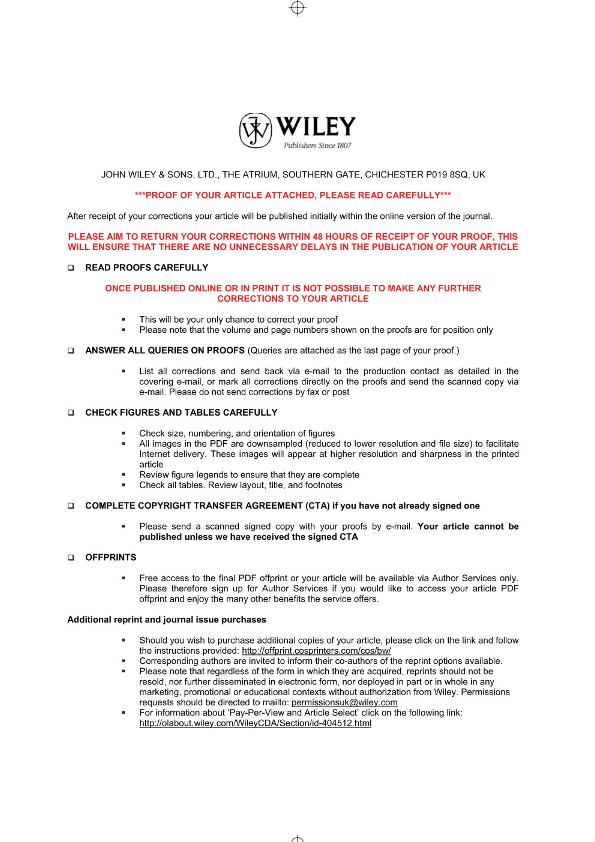Mostrar el registro sencillo del ítem
dc.contributor.author
Renton, Michael
dc.contributor.author
Busi, Roberto
dc.contributor.author
Neve, Paul
dc.contributor.author
Thornby, David
dc.contributor.author
Vila Aiub, Martin Miguel

dc.date.available
2016-02-17T20:48:49Z
dc.date.issued
2014-03
dc.identifier.citation
Renton, Michael; Busi, Roberto; Neve, Paul; Thornby, David; Vila Aiub, Martin Miguel; Herbicide resistance modelling: past, present and future; Wiley; Pest Management Science; 70; 9; 3-2014; 1394–1404
dc.identifier.issn
1526-498X
dc.identifier.uri
http://hdl.handle.net/11336/4240
dc.description.abstract
Computer simulation modelling is an essential aid in building an integrated understanding of how different factors interact to affect the evolutionary and population dynamics of herbicide resistance, and thus helps in predicting and managing how agricultural systemswill beaffected. In this review,why computer simulation modelling is such animportant tool and framework for dealingwith herbicide resistance is first discussed. The questions related to herbicide resistance that have been addressed to date using simulation modelling are then explained, and the modelling approaches that have been used are discussed, focusing first on the earlier, more general approaches, and then on some newer, more innovative approaches. How these approaches could be further developed in the future, by drawing on modelling techniques that are already employed in other areas, such as individual-based and spatially explicit modelling approaches, is then considered, aswell as the possibility of better representing genetics, competition and economics, and finally the questions and issues of importance to herbicide resistance research and management that could be addressed using these new approaches are discussed. It is concluded that it is necessary to proceed with cautionwhen increasing the complexity of models by adding newdetails, but,with appropriate care, more detailed models will make it possible to integrate more current knowledge in order better to understand, predict and ultimately manage the evolution of herbicide resistance.
dc.format
application/pdf
dc.language.iso
eng
dc.publisher
Wiley

dc.rights
info:eu-repo/semantics/openAccess
dc.rights.uri
https://creativecommons.org/licenses/by-nc-sa/2.5/ar/
dc.subject
Computer
dc.subject
Simulation
dc.subject
Evolution
dc.subject
Integration
dc.subject
Genetics
dc.subject.classification
Ecología

dc.subject.classification
Ciencias Biológicas

dc.subject.classification
CIENCIAS NATURALES Y EXACTAS

dc.title
Herbicide resistance modelling: past, present and future
dc.type
info:eu-repo/semantics/article
dc.type
info:ar-repo/semantics/artículo
dc.type
info:eu-repo/semantics/publishedVersion
dc.date.updated
2016-03-30 10:35:44.97925-03
dc.journal.volume
70
dc.journal.number
9
dc.journal.pagination
1394–1404
dc.journal.pais
Estados Unidos

dc.journal.ciudad
Hoboken
dc.description.fil
Fil: Renton, Michael. University of Western Australia. Australian Herbicide Resistance Initiative and Institute of Agriculture. School of Plant Biology; Australia
dc.description.fil
Fil: Busi, Roberto. University of Western Australia. Australian Herbicide Resistance Initiative and Institute of Agriculture. School of Plant Biology; Australia
dc.description.fil
Fil: Neve, Paul. University of Warwick. School of Life Sciences; Reino Unido
dc.description.fil
Fil: Thornby, David. Queensland Department of Agriculture, Fisheries and Forestry; Australia
dc.description.fil
Fil: Vila Aiub, Martin Miguel. Consejo Nacional de Investigaciones Científicas y Técnicas. Oficina de Coordinación Administrativa Parque Centenario. Instituto de Investigaciones Fisiológicas y Ecológicas Vinculadas a la Agricultura; Argentina. University of Western Australia. Australian Herbicide Resistance Initiative and Institute of Agriculture. School of Plant Biology; Australia
dc.journal.title
Pest Management Science

dc.relation.alternativeid
info:eu-repo/semantics/altIdentifier/url/http://onlinelibrary.wiley.com/doi/10.1002/ps.3773/abstract
dc.relation.alternativeid
info:eu-repo/semantics/altIdentifier/doi/http://dx.doi.org/DOI:10.1002/ps.3773
dc.relation.alternativeid
info:eu-repo/semantics/altIdentifier/issn/1526-498X
Archivos asociados
